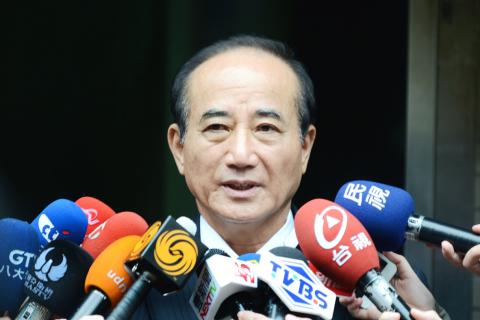Legislative Speaker Wang Jin-pyng (王金平) yesterday said that the Legislative Yuan has heard the students’ demands and that he would use all possible channels to seek a solution and respond to their appeals.
Wang issued a statement last night calling on the students who have been occupying the legislative chamber since Tuesday evening in protest against the controversial cross-strait service trade agreement to remain calm, exercise self-control and take care of their well-being as well as the public property inside the Legislative Yuan.
“These are items paid for by taxpayers’ money and we hope the Legislative Yuan can resume its normal proceedings soon and find a solution through democratic means,” the statement said.

Photo: Lu Chun-wei, Taipei Times
Earlier yesterday, Wang ruled out calling in law enforcement officers to remove the students from the chamber.
“For now, I am only thinking of the students’ safety and am not considering having them removed by force,” Wang said in response to reporters’ questions.
Having students occupy the legislative chamber is not a question of legislative autonomy, but of social order, Wang said.
It is not that the police have no right to intervene in the protest because it is taking place in the legislature, but the top concern for now is the students’ safety, he added.
Wang has not been to his office in the legislative building since the students stormed and occupied the chamber on Tuesday.
Security has been tightened in front of Wang’s office.
Police have also set up barricades on Jinan Road and Zhenjiang Street, both of which lead to the legislative building.
Only lawmakers and members of the press with legislative passes are allowed to enter the building.
Meanwhile, the Presidential Office said last night that President Ma Ying-jeou (馬英九) would exercise his right of mediation in accordance with Article 44 of the Constitution by summoning Vice President Wu Den-yih (吳敦義), Wang and Premier Jiang Yi-huah (江宜樺) this morning to talk about the Legislative Yuan resuming its duties.
Article 44 states: “The President, if not restricted by other articles in the Constitution, may summon the presidents of the five yuan to mediate a solution to inter-yuan disputes.”

Intelligence agents have recorded 510,000 instances of “controversial information” being spread online by the Chinese Communist Party (CCP) so far this year, the National Security Bureau (NSB) said in a report yesterday, as it warned of artificial intelligence (AI) being employed to generate destabilizing misinformation. The bureau submitted a written report to the Legislative Yuan in preparation for National Security Bureau Director-General Tsai Ming-yen’s (蔡明彥) appearance before the Foreign Affairs and National Defense Committee today. The CCP has been using cognitive warfare to divide Taiwanese society by commenting on controversial issues such as Taiwan Semiconductor Manufacturing Co’s (TSMC, 台積電) investments in the

INVESTIGATION: The case is the latest instance of a DPP figure being implicated in an espionage network accused of allegedly leaking information to Chinese intelligence Democratic Progressive Party (DPP) member Ho Jen-chieh (何仁傑) was detained and held incommunicado yesterday on suspicion of spying for China during his tenure as assistant to then-minister of foreign affairs Joseph Wu (吳釗燮). The Taipei District Prosecutors’ Office said Ho was implicated during its investigation into alleged spying activities by former Presidential Office consultant Wu Shang-yu (吳尚雨). Prosecutors said there is reason to believe Ho breached the National Security Act (國家安全法) by leaking classified Ministry of Foreign Affairs information to Chinese intelligence. Following interrogation, prosecutors petitioned the Taipei District Court to detain Ho, citing concerns over potential collusion or tampering of evidence. The

‘COMPREHENSIVE PLAN’: Lin Chia-lung said that the government was ready to talk about a variety of issues, including investment in and purchases from the US The National Stabilization Fund (NSF) yesterday announced that it would step in to staunch stock market losses for the ninth time in the nation’s history. An NSF board meeting, originally scheduled for Monday next week, was moved to yesterday after stocks plummeted in the wake of US President Donald Trump’s announcement of 32 percent tariffs on Taiwan on Wednesday last week. Board members voted to support the stock market with the NT$500 billion (US$15.15 billion) fund, with injections of funds to begin as soon as today. The NSF in 2000 injected NT$120 billion to stabilize stocks, the most ever. The lowest amount it

NEGOTIATIONS: Taiwan has good relations with Washington and the outlook for the negotiations looks promising, Minister of Economic Affairs J.W. Kuo said Taiwan’s GDP growth this year is expected to decrease by 0.43 to 1.61 percentage points due to the effects of US tariffs, National Development Council (NDC) Minister Paul Liu (劉鏡清) said at a meeting of the legislature’s Economics Committee in Taipei yesterday, citing a preliminary estimate by a private research institution. Taiwan’s economy would be significantly affected by the 32 percent “reciprocal” tariffs slapped by the US, which took effect yesterday, Liu said, adding that GDP growth could fall below 3 percent and potentially even dip below 2 percent to 1.53 percent this year. The council has commissioned another institution